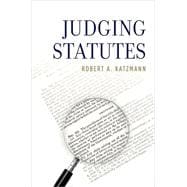In the last twenty-five years, there has been a raging debate over how judges should interpret the laws of Congress - called federal statutes. In an ideal world, federal statutes would always be clearly worded and easily-understood by the judges tasked with interpreting them, But many laws are worded ambiguously or even contradictorily, requiring the judge to divine their meaning. Should, for example, the judge understand "convicted in any court" to include any court in the world, or simply any court in the United States? How is the judge to determine the answer? Should she stick only to the text? To what degree, if any, should the judge consult aids beyond the statutes themselves, including legislative materials, when interpreting laws? Are the purposes of lawmakers in writing law relevant?
Some judges, such as Supreme Court Justice Antonin Scalia, believe courts should look to the language of the statute and virtually nothing else. Chief Judge Robert A. Katzmann of the U.S. Court of Appeals for the Second Circuit respectfully disagrees. In Judging Statutes, Judge Katzmann, both a trained political scientist and a judge, argues that our constitutional system charges Congress with enacting laws; so, how Congress makes its purposes known through both the laws themselves and reliable accompanying materials should be respected. He contends that when courts interpret the laws of Congress, they should pay greater attention to how Congress actually functions, how lawmakers signal their meaning in statutes, and what they expect from those interpreting its laws. The legislative record behind a law is in truth part of its foundation, and therefore merits consideration
Judge Katzmann begins his argument with a look at how the American government works, including how laws come to be and how various agencies construe legislation. He then explains the judicial process of interpreting and applying these laws through the demonstration of two interpretative approaches, purposivism-that is, focusing on the purpose of a law-and textualism-that is, focusing on the text of the written law itself. Judge Katzmann draws from his personal experience on the U.S. Court of Appeals in showing how this process plays out in the real world, and concludes with some suggestions to promote understanding between the courts and Congress.








